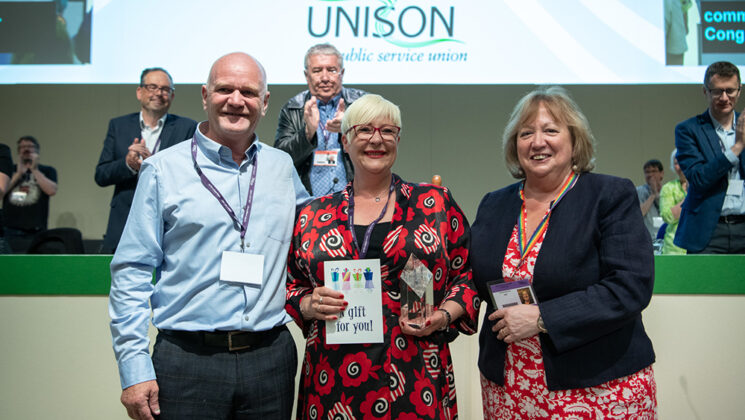The second morning of UNISON’s local government conference opened with the presentation of awards for the union’s Local Service Champions, with delegates rising to their feet for a standing ovation for the winners, who were chosen from nearly a thousand nominees.
Paddy Toner from Halton Borough Council was the overall winner. A rehabilitation worker, who helps people who have a vision impairment to stay in their own homes and remain independent, Mr Toner was unable to be in Brighton, but will be receiving his award at the union’s national disabled members’ conference in the autumn.
Dawn Hallewell, one of the runners up was able to attend conference to receive her award in person.
Ms Hallewell is a County Durham family support officer who helps struggling families in the North East. “I do it because I’m a people person,” she said in a short film delegates watched beforehand.
General secretary Christina McAnea presented the award – together with service group chair Glenn Williams (pictured above).
Down to business
Returning to debates, Pam Howard for the service group executive moved a motion on school support staff.
“Schools were open in the pandemic, so that key workers could keep going to work,” she told delegates – in spite of the UK government’s continued pretence that schools were closed.
“We are committed to holding this government to account,” she said.
Karen Jackson from Newcastle City Council reminded conference that school support staff are the “backbone” of schools, noting that this government “refuses to give support staff the recognition they deserve”.
She stressed how during much of the pandemic, school support staff were helping to care for families in their communities. She described this workforce as “unsung heroes”.
Leaving because of exhaustion
Jessica from Bridgend has spent 17 years as a school support worker, the last eight working in a special needs school, but is set to leave the job in six weeks.
When her school was near to closing during the pandemic because of staff falling ill, she had to take on five personal assistant roles and an evening job in order to survive. Describing herself as exhausted, she said that she is leaving to take up a role as a learning disabilities nurse.
“This is why our teaching assistants deserve a decent wage,” she concluded.
Beverly Berwick from Barnet told how she had heard from teaching assistants (TAs) and support staff about how they were feeling unprotected in the pandemic as they looked after children, while many teachers were allowed to work from home.
She had taken calls from TAs who were being blamed when the roll out of PPE in schools went wrong, pregnant workers who were told they were not pregnant ‘enough’ to have to shield, and Black staff who were told to take unpaid leave if their children or their children’s bubbles were sent home from school.
Conference called on the executive to:
- run a high-profile public campaign to highlight the invaluable work of school support staff;
- reaffirm the group’s support for the reinstatement of the School Support Staff Negotiating Body in England;
- continue to campaign, nationally and locally, for all outsourced services in schools and colleges to be brought back in-house.
Tackling multi-academy trusts
Moving a motion on organising in multi-academy trusts (MATs), Jane Shortland for the Northern Region noted that “all the Catholic schools in my area are being transferred to the Bishop Chadwick Trust”. When visiting schools, she encounters staff with major concerns about potential changes to terms and conditions.
Mark Sage from Portsmouth City Branch highlighted how the “Con-Dem coalition leapt on to academies … it’s ideological … anything to make a profit”.
Citing how managers in MATs will be looking at how to increase profits – making children eat the infamous turkey twizzlers again instead of decent nutritious meals – he called on people to join the TUC demo in London on Saturday.
For the executive, Carol Garfield told delegates that UNISON campaigns consistently against forced academisation, noting that there is a “lack of evidence that academies have higher and more improved standards.” Indeed, she mentioned research that shows that state-run schools have better results.
Delegates agreed a range of measures, including calling on the executive to:
- further strengthen the fight against cuts to school funding;
- roll out job evaluation training for reps to prepare for consolidated pay and grading structures in MATs that cross local authority and regional borders;
- campaign for all schools to be NJC-aligned.
In a motion on the “scourge” of term-time working, delegates heard that “somebody’s paid to come up with these ideas”, taking pay from the lowest paid workers. Conference heard that while bills are paid all year round, these members are only paid in term-time.
Conference called on the executive to develop further guidance, advice and training for branches dealing with term-time working issues, and to continue to challenge employers who are believed to be discriminating against term-time workers.






